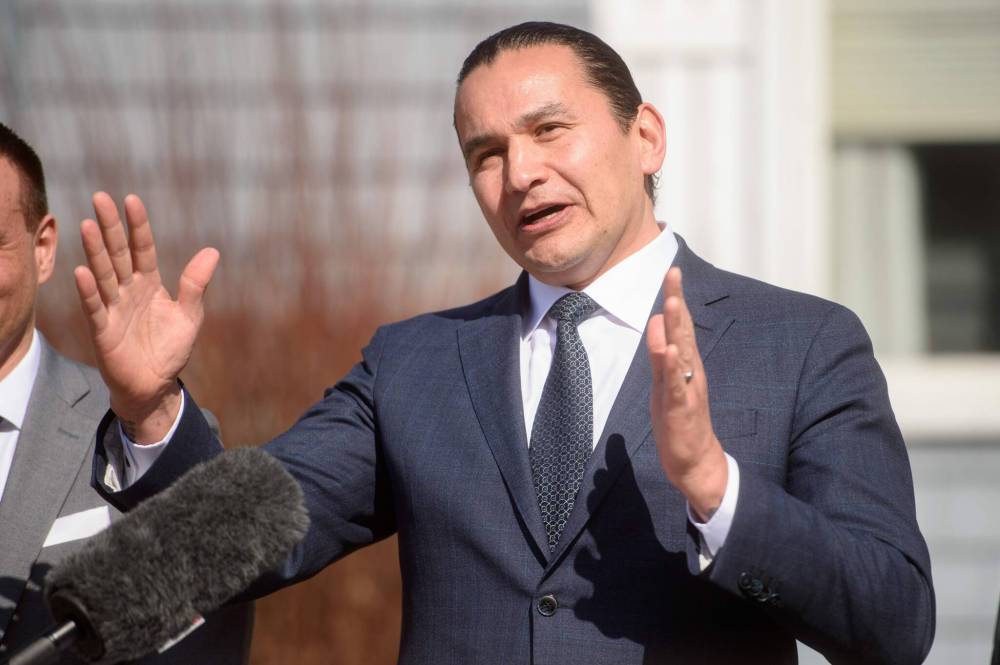The COVID-19 inquiry is dead. Long live the expert-led review.
Buried deep within the NDP government’s inaugural budget was a somewhat muddy admission by Premier Wab Kinew that Manitoba will not hold a full commission of inquiry into the province’s pandemic response.
The budget did set aside $500,000 to do preparation for an inquiry into the Winnipeg Police Service headquarters scandal. But despite having promised for years to hold a legally empowered inquiry into the pandemic, the post-mortem of the COVID-19 response was suddenly downgraded to “a review.”

Mike Sudoma/Free Press Files
Then-leader of the opposition NDP Wab Kinew started demanding an inquiry into the province’s pandemic response as far back as 2021.
According to a government official, there will be a review, to be defined in some manner later this year, led by a subject matter expert of some description. But no judicial inquiry.
The question left hanging in the air is whether downgrading from inquiry to review will provide enough insight to help plan for the next pandemic. Theoretically, the answer is yes. It’s just that it will be a whole lot less fun.
Kinew and the NDP opposition started demanding an inquiry as far back as 2021, when it became clear that Manitoba had among the worst overall pandemic responses of any Canadian province. Kinew said that based on this woeful performance, Manitobans needed a “robust,” fully public inquiry led by independent, non-partisan experts.
“It is often said that those who fail to learn from history will end up repeating it,” Kinew told the Free Press in November 2021 after releasing the NDP opposition’s alternative speech from the throne. “With recommendations from this independent inquiry we can make positive and lasting changes to improve the lives of Manitoba families.”
Even if Kinew’s demands were equal measures politics and public interest, he was not wrong to demand an inquiry.
Two years into the pandemic, Manitoba quickly established itself as having the second-highest COVID-19 death rate, and was one of the only provinces forced by hospital overcrowding to send extremely ill patients to be treated in other provinces. Woven into those troubling metrics were frequent stories of miscommunication, obvious political meddling in public health orders and a complete lack of consistency in the application of economic and social restrictions.
To be fair, these problems were hardly unique to Manitoba. When COVID-19 reared its ugly head in early 2020, it quickly became apparent that all governments in this country were woefully unprepared.
From a shortage of personal protective equipment to a complete absence of disease-control protocols to deal with a virus as pervasive as COVID-19, Canada’s health-care system and that of most other countries struggled to find the right balance of restrictions and freedoms while awaiting development of vaccines.
Still, why would the Kinew government go back on a long-standing pledge, one that it repeated before last fall’s provincial election?
NDP government sources indicated that while a public inquiry would likely produce some valuable insight into the pandemic response, it would be difficult to control some of the collateral and volatile politics that would no doubt accompany public hearings.
The Tories and their supporters would accuse Kinew of weaponizing the pandemic to score political points. More than one NDP source suggested this is what former Tory premier Brian Pallister did when he hired former Saskatchewan premier Brad Wall to review cost overruns in two huge Manitoba Hydro capital projects.
Wall’s final report was a mostly derivative compendium of long-standing political gripes about NDP management of the Hydro projects. Several sources said Kinew does not want to repeat of that approach.
There are also concerns a COVID-19 inquiry would serve as a lightening rod for anti-vaccine, anti-restriction activists, who have now fully absorbed anti-immigration and anti-LGBTTQ+ sentiments into their ideology. In other words, the inquiry would become a rallying point for a political movement that, while it is not growing in numbers, is most certainly growing in toxicity.
Those may be good reasons for downgrading the investigation of the pandemic response but Kinew must still create a mechanism that has the power to drill deep enough to get a clear picture of the problems. That will be difficult without public testimony, but not impossible.
It’s hard not to salivate at the prospect of testimony from key public health officials on the tenor and content of discussions with Pallister and cabinet ministers, and the degree to which politics trumped science in key decisions.
Even if we’re not going to get the opportunity to witness public testimony, it does not mean we’ve lost the opportunity to deal with some of the obvious flaws in the Progressive Conservative government’s pandemic response.
For example, it would be good if a review could clarify the hierarchy of decision-making during public health crises.
Are major decisions made by public health leaders or by political leaders? And if it’s the latter, we need a legal requirement to force politicians to publicly confirm directives that conflict with the advice of public health officials. It was, at times, impossible to tell who was driving the Tory pandemic response bus.
An expert-led review can still be a valuable opportunity to draft recommendations on that and other issues so we can do a better job next time.
Because there will most definitely be a next time.
dan.lett@winnipegfreepress.com

Dan Lett
Columnist
Born and raised in and around Toronto, Dan Lett came to Winnipeg in 1986, less than a year out of journalism school with a lifelong dream to be a newspaper reporter.